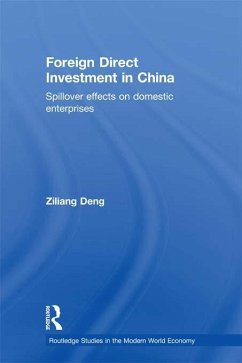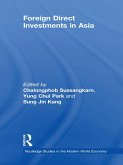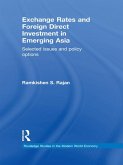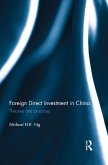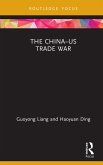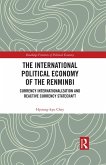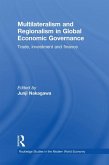Ziliang Deng
Foreign Direct Investment in China (eBook, ePUB)
Spillover Effects on Domestic Enterprises
47,95 €
47,95 €
inkl. MwSt.
Sofort per Download lieferbar

24 °P sammeln
47,95 €
Als Download kaufen

47,95 €
inkl. MwSt.
Sofort per Download lieferbar

24 °P sammeln
Jetzt verschenken
Alle Infos zum eBook verschenken
47,95 €
inkl. MwSt.
Sofort per Download lieferbar
Alle Infos zum eBook verschenken

24 °P sammeln
Ziliang Deng
Foreign Direct Investment in China (eBook, ePUB)
Spillover Effects on Domestic Enterprises
- Format: ePub
- Merkliste
- Auf die Merkliste
- Bewerten Bewerten
- Teilen
- Produkt teilen
- Produkterinnerung
- Produkterinnerung

Bitte loggen Sie sich zunächst in Ihr Kundenkonto ein oder registrieren Sie sich bei
bücher.de, um das eBook-Abo tolino select nutzen zu können.
Hier können Sie sich einloggen
Hier können Sie sich einloggen
Sie sind bereits eingeloggt. Klicken Sie auf 2. tolino select Abo, um fortzufahren.

Bitte loggen Sie sich zunächst in Ihr Kundenkonto ein oder registrieren Sie sich bei bücher.de, um das eBook-Abo tolino select nutzen zu können.
The book's innovative and original perspectives over the hot economic issues in the contemporary world economy makes it an ideal pedagogical handbook for researchers working on related topics.
- Geräte: eReader
- mit Kopierschutz
- eBook Hilfe
- Größe: 7.46MB
Andere Kunden interessierten sich auch für
![Foreign Direct Investments in Asia (eBook, ePUB) Foreign Direct Investments in Asia (eBook, ePUB)]() Foreign Direct Investments in Asia (eBook, ePUB)56,95 €
Foreign Direct Investments in Asia (eBook, ePUB)56,95 €![Exchange Rates and Foreign Direct Investment in Emerging Asia (eBook, ePUB) Exchange Rates and Foreign Direct Investment in Emerging Asia (eBook, ePUB)]() Ramkishen RajanExchange Rates and Foreign Direct Investment in Emerging Asia (eBook, ePUB)46,95 €
Ramkishen RajanExchange Rates and Foreign Direct Investment in Emerging Asia (eBook, ePUB)46,95 €![Foreign Direct Investment in Central and Eastern Europe (eBook, ePUB) Foreign Direct Investment in Central and Eastern Europe (eBook, ePUB)]() Foreign Direct Investment in Central and Eastern Europe (eBook, ePUB)25,95 €
Foreign Direct Investment in Central and Eastern Europe (eBook, ePUB)25,95 €![Foreign Direct Investment in China (eBook, ePUB) Foreign Direct Investment in China (eBook, ePUB)]() Michael H. K. NgForeign Direct Investment in China (eBook, ePUB)48,95 €
Michael H. K. NgForeign Direct Investment in China (eBook, ePUB)48,95 €![The China-US Trade War (eBook, ePUB) The China-US Trade War (eBook, ePUB)]() Guoyong LiangThe China-US Trade War (eBook, ePUB)22,95 €
Guoyong LiangThe China-US Trade War (eBook, ePUB)22,95 €![The International Political Economy of the Renminbi (eBook, ePUB) The International Political Economy of the Renminbi (eBook, ePUB)]() Hyoung-Kyu CheyThe International Political Economy of the Renminbi (eBook, ePUB)44,95 €
Hyoung-Kyu CheyThe International Political Economy of the Renminbi (eBook, ePUB)44,95 €![Multilateralism and Regionalism in Global Economic Governance (eBook, ePUB) Multilateralism and Regionalism in Global Economic Governance (eBook, ePUB)]() Multilateralism and Regionalism in Global Economic Governance (eBook, ePUB)48,95 €
Multilateralism and Regionalism in Global Economic Governance (eBook, ePUB)48,95 €-
-
-
The book's innovative and original perspectives over the hot economic issues in the contemporary world economy makes it an ideal pedagogical handbook for researchers working on related topics.
Dieser Download kann aus rechtlichen Gründen nur mit Rechnungsadresse in A, B, BG, CY, CZ, D, DK, EW, E, FIN, F, GR, HR, H, IRL, I, LT, L, LR, M, NL, PL, P, R, S, SLO, SK ausgeliefert werden.
Produktdetails
- Produktdetails
- Verlag: Taylor & Francis eBooks
- Seitenzahl: 288
- Erscheinungstermin: 1. März 2013
- Englisch
- ISBN-13: 9781136672637
- Artikelnr.: 38272925
- Verlag: Taylor & Francis eBooks
- Seitenzahl: 288
- Erscheinungstermin: 1. März 2013
- Englisch
- ISBN-13: 9781136672637
- Artikelnr.: 38272925
- Herstellerkennzeichnung Die Herstellerinformationen sind derzeit nicht verfügbar.
Dr Ziliang Deng is Assistant Professor at the School of Business, Renmin University of China. He possesses BA and MA degrees from Renmin University of China, Postgraduate Research Certificate from Nanyang Technological University (Singapore), and PhD degree from the University of Nottingham (UK). Dr Deng has taken various consultancy activities for the Ministry of Commerce (China), and has teaching experiences at Nanyang Technological University, the University of Nottingham, the University of Manchester, and Keele University (UK). This research conducted for this monograph is sponsored by UK-China Scholarships for Excellence, jointly funded by the Ministry of Education (China) and the Department for Business, Innovation and Skills (UK).
Part 1: Stylised Facts and Literature Review 1. Stylized Facts of FDI
Inflow to China and Its Spillovers 2. A Review on Foreign Direct Investment
and Productivity Spillovers Part 2: Econometric Analyses for Quantifying
the Spillover Effects 3. The Interplay between Foreign and Domestic
Enterprises: Firm-Level Analysis 4. What Do the Aggregate Data Tell Us?
Industry-Level Analysis Part 3: A General Equilibrium Framework for
Quantifying the Spillover Effects 5. Computable General Equilibrium
Modelling 6. Data Compilations 7. A Benchmark CGE Model for the Chinese
Economy and its Extensions 8. Magnitude and Pattern of Productivity
Spillovers Part 4: Significant Impact of FDI Productivity Spillovers? 9.
Swapping Market Access for Productivity Spillovers? An Assessment of 2008
Corporate 10. Why the Chinese Banking System Survived the Global Financial
Crisis? The Role of WTO Accession and FDI Efficiency Spillovers 11. East
Asian Insutry Transfer, FDI Productivity Spillovers and U.S.-China Trade
Imbalance 12. Concluding Remarks
Inflow to China and Its Spillovers 2. A Review on Foreign Direct Investment
and Productivity Spillovers Part 2: Econometric Analyses for Quantifying
the Spillover Effects 3. The Interplay between Foreign and Domestic
Enterprises: Firm-Level Analysis 4. What Do the Aggregate Data Tell Us?
Industry-Level Analysis Part 3: A General Equilibrium Framework for
Quantifying the Spillover Effects 5. Computable General Equilibrium
Modelling 6. Data Compilations 7. A Benchmark CGE Model for the Chinese
Economy and its Extensions 8. Magnitude and Pattern of Productivity
Spillovers Part 4: Significant Impact of FDI Productivity Spillovers? 9.
Swapping Market Access for Productivity Spillovers? An Assessment of 2008
Corporate 10. Why the Chinese Banking System Survived the Global Financial
Crisis? The Role of WTO Accession and FDI Efficiency Spillovers 11. East
Asian Insutry Transfer, FDI Productivity Spillovers and U.S.-China Trade
Imbalance 12. Concluding Remarks
Part 1: Stylised Facts and Literature Review 1. Stylized Facts of FDI
Inflow to China and Its Spillovers 2. A Review on Foreign Direct Investment
and Productivity Spillovers Part 2: Econometric Analyses for Quantifying
the Spillover Effects 3. The Interplay between Foreign and Domestic
Enterprises: Firm-Level Analysis 4. What Do the Aggregate Data Tell Us?
Industry-Level Analysis Part 3: A General Equilibrium Framework for
Quantifying the Spillover Effects 5. Computable General Equilibrium
Modelling 6. Data Compilations 7. A Benchmark CGE Model for the Chinese
Economy and its Extensions 8. Magnitude and Pattern of Productivity
Spillovers Part 4: Significant Impact of FDI Productivity Spillovers? 9.
Swapping Market Access for Productivity Spillovers? An Assessment of 2008
Corporate 10. Why the Chinese Banking System Survived the Global Financial
Crisis? The Role of WTO Accession and FDI Efficiency Spillovers 11. East
Asian Insutry Transfer, FDI Productivity Spillovers and U.S.-China Trade
Imbalance 12. Concluding Remarks
Inflow to China and Its Spillovers 2. A Review on Foreign Direct Investment
and Productivity Spillovers Part 2: Econometric Analyses for Quantifying
the Spillover Effects 3. The Interplay between Foreign and Domestic
Enterprises: Firm-Level Analysis 4. What Do the Aggregate Data Tell Us?
Industry-Level Analysis Part 3: A General Equilibrium Framework for
Quantifying the Spillover Effects 5. Computable General Equilibrium
Modelling 6. Data Compilations 7. A Benchmark CGE Model for the Chinese
Economy and its Extensions 8. Magnitude and Pattern of Productivity
Spillovers Part 4: Significant Impact of FDI Productivity Spillovers? 9.
Swapping Market Access for Productivity Spillovers? An Assessment of 2008
Corporate 10. Why the Chinese Banking System Survived the Global Financial
Crisis? The Role of WTO Accession and FDI Efficiency Spillovers 11. East
Asian Insutry Transfer, FDI Productivity Spillovers and U.S.-China Trade
Imbalance 12. Concluding Remarks
